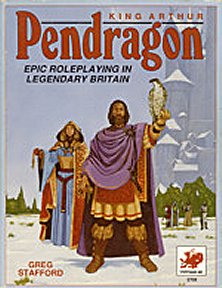Francisco asked a great question in the comments today, and I though it would take a full post to answer him, so here it is.
Maybe, you could give me a good answer to this question: Is Pendragon a good game for sandboxing? What is its behaviour? What kind of things should be considered? Thanks.
Pendragon is an interesting choice for sandbox gaming and I'm of two minds about it. Before I go into too much detail, I want to talk briefly about how a typical Pendragon campaign works, at least the ones that I've run.
I play the 3rd edition of Pendragon (not that it matters a whole lot, they're all pretty much 99% the same) and start every campaign with the mini-scenario found in the back of the book. Being away from my study, I cannot remember it's name. Regardless, the scenario begins with the character being knighted, having a joust, going on a hunt, encountering some bandits on the road, and finally being introduced to their Lord's court. It's a great scenario to introduce character into the game--which is why I use it-- and creats some interesting group dynamics (the winner of the joust becomes the leader of the hunt).
That's session 1. It's pretty railroady, but a fine introduction to both the mechanics and tone of the game (tone is important).
After that, I pick a starting year or event and grab Le Morte D'Arthur off the bookcase, usually Arthur pulling the sword from the stone. From there, the players can do whatever they want in your typically sandbox fashion. I usually try and make the player's original lord pretty lax. Making sure he doesn't ask them to do any specifically, but instead invites them to court, makes suggestions on potential adventures, lets them know what's going on in the world. Each year there an event from Le Morte D'Arthur that the players can choose to participate in or not (I usually have a couple D&D style, location-based adventures up my sleeve as well).
I do, however, run each battle on my own and play out most scenarios in my own time even if the players choose to ignore them. Why? Because the fun really begins when the story goes haywire: usually, when Arthur ending up dead.
To me this is wear the metaplot stops and the sandbox begins. Having run three year-long campaigns this way, each one completely different, I can say it feels very much like a sandbox, although not necessarily location-based exploration. My favorite involved one of the players killing Arthur and taking over his kingdom; another ended up like Robin Hood with the characters as ex-knights to a corrupt king. All three were tons of fun.
So, I hope this answered your question, Francisco. If not, I'd be more than happy to answer more of your (or anyone else's) questions in the comments or write a follow-up post.



No comments:
Post a Comment